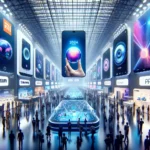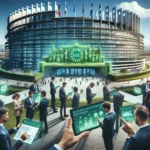Brought to you by Keysight Technologies
With the 2030 Agenda for Sustainable Development set by the United Nations looming on the horizon, technology stands as a pivotal force in achieving an array of global goals. These ambitions range from combating climate change and enhancing health services to fostering education and economic growth worldwide. For technology companies, this era demands not only the creation of innovative solutions but also the delivery of these solutions in a manner that is both flawless and competitively priced.
The key to staying ahead in this dynamic landscape is the evolution of how technology providers approach challenges, optimizing every facet of their operations. The age-old practice of working in isolation is no longer viable for achieving significant business or environmental goals.
We are now navigating a post-Moore’s Law era, where groundbreaking innovations require the collaboration and collective genius of various sectors and disciplines. The once rigid industry silos are dissolving, leading to rapid advancements in technology that redefine our daily lives.
The integration of artificial intelligence (AI), machine learning (ML), and digital twin technologies, coupled with cross-industry best practices, is revolutionizing fields from the metaverse and automotive industries to telecommunications and healthcare.
The Metaverse: A Unified Digital and Physical Reality
The metaverse concept has evolved far beyond its initial scope, now encompassing a broad range of mixed-reality applications. This digital-physical realm promises to bridge the gap created by physical distance, enhancing human connections across the globe. Achieving this seamless integration requires the combined power of 5G and 6G, along with advances in extended reality and CGI. The challenge lies in ensuring these technologies can interoperate smoothly, offering a truly immersive experience.
Automotive Industry: The Shift to Software-Defined Innovation
The transition from hardware-centric to software-defined vehicles marks a significant shift in the automotive industry. This evolution necessitates a collaborative approach in design and testing to ensure the reliability of complex software systems, especially those enabling autonomous driving. The development of autonomous vehicles demands close cooperation across companies, regulators, and standards bodies to establish safety and performance standards.
Space 3.0: Expanding Connectivity Beyond Earth
The advent of non-terrestrial networks (NTNs) heralds a new frontier in connectivity, addressing limitations posed by traditional terrestrial networks. This innovation promises enhanced communication for remote areas and during emergencies. The challenge now is to foster an open ecosystem for satellite connectivity, ensuring interoperability and minimizing space debris through collaborative efforts.
Digital Healthcare: Towards Personalized and Predictive Care
The healthcare crisis exacerbated by the pandemic has underscored the need for a digital overhaul. Technologies like AI and advanced sensor systems are poised to revolutionize diagnostics and treatment, making healthcare more personalized and efficient. This requires a unified approach to technology development, emphasizing interoperability and data security to truly harness the power of digital health.
As we move forward, the destruction of silos and the embrace of cross-disciplinary innovation are crucial for shaping a sustainable and equitable future. The fusion of diverse technologies and expertise opens unprecedented possibilities, making what seemed like distant futures a tangible reality. In an interconnected world, the collective endeavor towards innovation stands as our greatest hope in addressing the pressing challenges of our time.
















